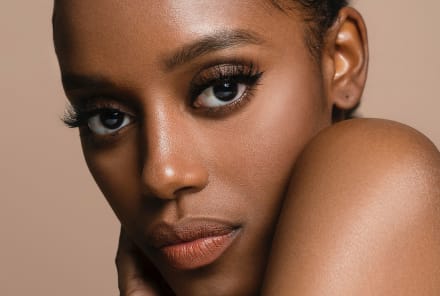Advertisement
Nodular Acne: What It Is, What Causes It + The Do's & Don'ts Of Care


No pimples are welcome. But when they're large, painful, and red, they're really annoying. Nodular acne is unique and isn't treated like your typical white- or blackhead. And if we're being honest, nodular acne can become a monster to deal with if you don't act quickly.
That's why detecting nodular acne in its early stages can help keep unwanted breakouts at bay. We tapped dermatologists to get the scoop on nodular acne, what it is, what causes it, and how to treat it so you can get your breakouts under control, stat. Keep reading to learn more.
What is nodular acne?
"Nodular acne is one of the most severe forms of acne, along with cystic," board-certified dermatologist Dendy Engelman, M.D., FAAD, says. "It occurs when C. acnes bacteria gets trapped in a pore along with sebum, or oil, and dead skin cells." This triggers an inflammatory response1 that results in the various forms of acne. That's why this form of acne can be painful and irritated.
Cosmetic and general dermatologist at Marmur Medical Rachel Maiman, M.D., says nodular acne affects deeper layers of the skin than the average breakout and has a higher risk of scarring coupled with a tendency to persist for weeks to months. Maiman says this type of acne, "often feels like firm knots under the skin and can be found on the face and body."
What does nodular acne look like?
Nodular acne is not easily mistaken for a common whitehead. This type of acne is pretty unique in its appearance and can really be quite a pain, literally. Maiman says nodular acne has the appearance of hard lesions on the face or body, and they feel like lumps that are under the skin. "They may be the same color as the skin, or they can be red and inflamed," Maiman says. They're also known to be tender or painful to touch.
Engelman adds that nodular acne is firmer than cystic acne and is also more widespread than typical pimples. But if you're experiencing a breakout that seems to be under the skin, red, inflamed, and/or painful, you'll want to book an appointment with your local dermatologist for treatment.
What causes nodular acne?
Like all types of acne, it can be quite the mystery figuring out where it comes from if you're not a pro. But Engelman says there are a few causes that are common like the combination of excess oil, dead skin cells, and C. acne bacteria.
"Nodular acne is more likely to form when there is an excess of these things, which can easily clog pores, get infected, and lead to a nodular acne breakout," she says. She also notes that the presence of C. acne bacteria is what causes the infection.
Another cause to consider is, you guessed it, hormones. "Hormones can cause oil production to increase, which makes breakouts more likely," Engelman says.
Maiman says when androgen (male) hormones increase, so does oil production. "Androgens also can change the chemical makeup of oil, making it thicker, which is more likely to clog pores, as well as a more desirable environment for acne-causing bacteria," Maiman explains.
But when it comes to discerning why some people are more likely to develop nodular acne over others, Maiman says it's still a mystery. "There does appear to be a genetic component, meaning that, if your parents or sibling had nodular acne, you're more likely to get it, too."
So, how do I treat nodular acne?
Before we dive into the do's of treating nodular acne, let's start with the don'ts.
DON'T pick at it
This rule is pretty universal for all forms of acne, but it's especially true for the nodular kind. "There is no pimple head to pop," warns Engelman. "So, trying to squeeze the bump will only cause pain and may even exacerbate the acne."
DON'T reach for your standard acne cream
Maiman says over-the-counter acne treatments simply aren't effective against nodular acne, no matter how consistently you apply it. So, save that spot treatment for your next whitehead instead.
DON'T use products that make your skin oily
Engelman says steer clear of skin care products that add excess oils to your skin. "Look for products that are labeled noncomedogenic, which means it won't clog your pores." Now is not the time to use that handy-dandy coconut you used to lather from head to toe.
DO book an appointment with your dermatologist
"If nodular acne is in consideration, you should see a dermatologist as soon as possible in order to reduce the chance of scarring," Maiman suggests. "Your dermatologist will know which medications to prescribe or recommend to treat and prevent any additional lesions from forming. This is usually prescription topicals."
DO consider a professional chemical peel
Engelman says in-office peels can help to remove excessive dead skin cells and trigger cell turnover, which makes you less prone to nodular acne. If you're prone to acne or have a family history of nodular acne, consider scheduling a regular peel with your dermatologist or esthetician to help keep breakouts at bay.
DO adjust your skin care regimen if you experience scarring
Nodular acne can leave unwanted scars. "If you have acne scarring, start incorporating hydroxyl acids and brightening ingredients like vitamin C, hydroquinone, and hydroquinone's plant-based alternative, alpha arbutin, into your routine." Hydroxy acids help remove dead skin cells and promote cell turnover, while brightening ingredients like vitamin C help to fade dark spots over time.
The takeaway
If you've got under-the-skin acne forming that is firm, red, and painful to the touch, you may be dealing with nodular acne. And while it can be quite inconvenient, visiting your local dermatologist as soon as possible is the best way to get this type of acne under control.
-v1646695196476.jpg?1148x800)











